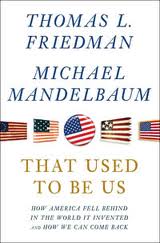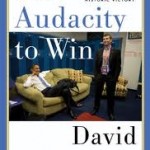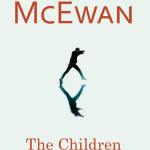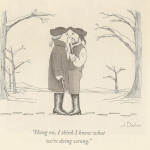That Used To Be Us by Thomas L. Friedman and Michael Mandelbaum
 If you are to read one book about the contemporary US socio-political and economic condition, That Used to Be Us
If you are to read one book about the contemporary US socio-political and economic condition, That Used to Be Us is the book to read. The book is written by Tom Friedman, the popular NY Times columnist and author and his good friend and colleague Michael Mandelbaum, Professor and Director of American Foreign Policy at the Johns Hopkins University School of Advanced School of Advanced International Studies who is also author or co-author of several important books. They have collaborated on a very well thought out analysis how the US is on the path to becoming a second rate country and how we can get back to the way we used to be.
The case is made that there are four essential new realities, which our country is now confronted:
1- Globalization
2- The IT Revolution
3- The Nation’s budgetary deficit
4- The Pattern of Energy Use
Each of these issues is dissected and it is shown how we have failed to adequately deal with each of them. The authors analyzed why we have been unsuccessful but they also tried to delineated the pathway that the US could follow back to greatness. Their style is one of facts and logic with numerous examples. They present their analysis with an empathic approach, which clearly comes from two people who clearly care about the country. While, I believe that they have some political bias, the book is not written from an ideological viewpoint or with a particular political agenda.
They explain at this time of globalization and the IT revolution, it is essential that the country address education, infrastructure, immigration, research and development and appropriate regulations which controls each of this categories. The failure of the US to rebuild it’s infrastructure of roads, rails, schools etc. misses the opportunity to create sorely needed new jobs and the failure to recognize global warming is a missed opportunity to develop new green industries. The authors repeat a suggestion that Friedman has been making for years that an oil tax would be a significant step in making the US less dependent on foreign oil and would also facilitate the development of a valuable alternate industry in the US. They explained that the budget deficit problem has to be understood by realizing that unemployment is remaining high even with the return of a great deal of the lost productivity. This is because of the IT revolution and the ability of computers and digitization to replace many old jobs. The authors make no bones about the absolute necessity of raising taxes and reducing entitlements in a bipartisan manner. They contrast the philosophy of the “Greatest Generation.” of saving for the future and the “Baby Boomers who are borrowing from future generations.
This book is geared towards the future and therefore, the discussion of education was one it’s most important contributions in this comprehensive look at Problem America.
Starting off with the simple statistic that we have had zero job creations since 1999 and taking into account the nature of globalization and the IT revolution, it is no surprise that a good part of the solution is investing in education. This means valuing teachers, principals, and an education system which can not only produce students who score on world wide standardized tests but students who from an early age can learn how think innovatively and creatively. A wonderful example is given how teachers can be valued comes from Williams College. In preparation for their graduation their seniors nominate their best high school teachers. The nominees are then carefully vetted .The top twenty or so are chosen to be honored at the Williams graduation and partake in special seminars in their honor during graduation week. Other such programs are described which are examples how teachers and principals can be rewarded in intangible as well as monetary ways.
One of the things that makes this book so special is that there are not only many micro-examples such as this one but there are macro-examples as well as metaphors, stories from films, books and everyday life. There also is a concluding chapter about “shock therapy” which is a potential political event, which if it happens might just cause the turning point that we need. You come away from reading this book with a feeling that the US is clearly in trouble but we have a 200-year history of pulling together to solve problems and of rising to the occasion to achieve leadership and greatness in the world. The book provides some well needed optimisms as to whether we can become “the way that used to be us.”













